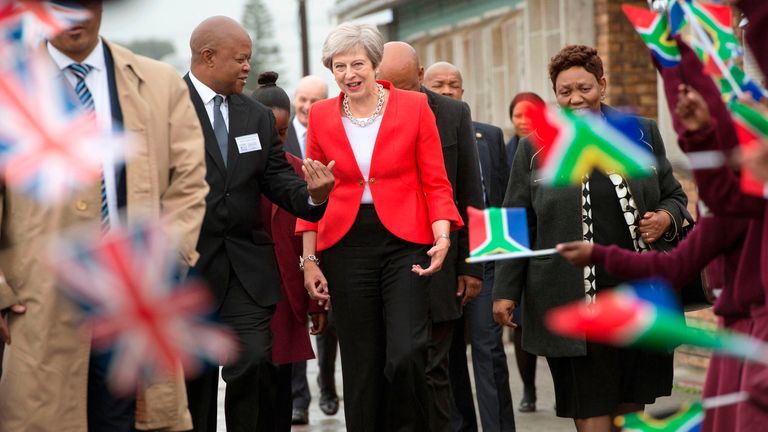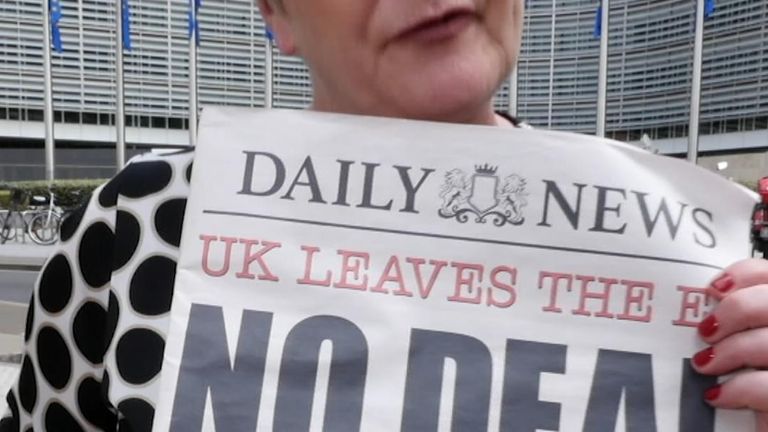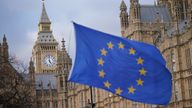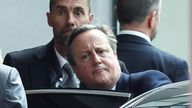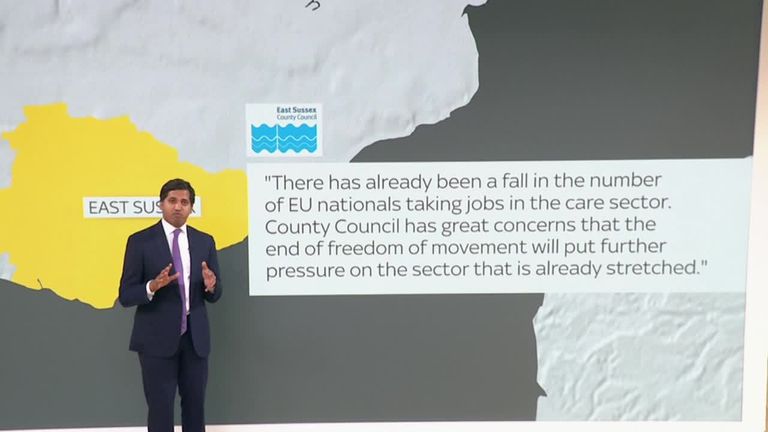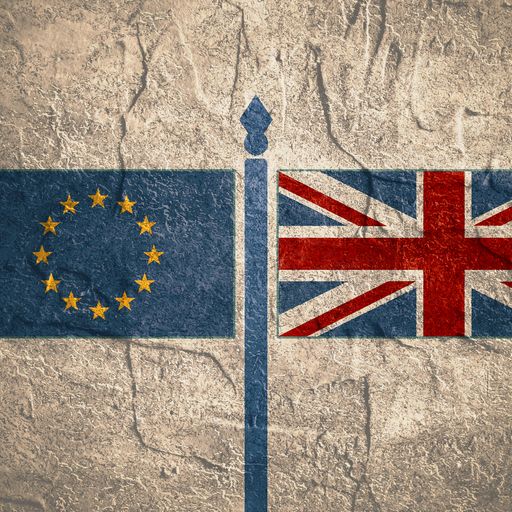Theresa May agrees that 'no-deal' Brexit 'wouldn't be the end of the world'
The PM says she supports a claim that such an outcome "would not be a walk in the park" but the UK would continue trading.
Tuesday 28 August 2018 18:11, UK
Theresa May has said she agrees with an assessment a "no-deal" Brexit "wouldn't be the end of the world", as she delivered a rebuke to her chancellor for warning of major consequences from such an outcome.
Speaking as she arrived in Africa for her first visit as prime minister, Mrs May repeated claims made by Roberto Azevedo, head of the World Trade Organisation, about what leaving the EU without a deal would be like.
She said: "He said about a no-deal situation that 'it would not be a walk in the park but it wouldn't be the end of the world'.
"What the government is doing is putting in place the preparations such that if we're in that situation we can make a success of it, just as we will make a success of the good deal I believe we're able to get and the good deal we're working to get."
:: Britain under 'no-deal': A far cry from 'less red tape'
When asked whether she thought her chancellor was right in his assessment of the economic impact of no-deal - as outlined in a letter to the treasury select committee last week - the PM refused to endorse Philip Hammond's position, stating that the figures he quoted were out of date.
Mr Hammond had told committee chair Nicky Morgan that GDP under no-deal would be up to 10.3% lower that it would have been otherwise.
Mrs May said: "First of all, the chancellor was talking about a set of figures that I think came out in January.
"I think when they came out I was very clear on a previous trip that those figures were a work in progress at that particular time."
Her failure to back Mr Hammond and his prognosis for no-deal will be cheered by the Brexiteer wing of the party.
Mr Azevedo had told BBC Radio 4 that while there would be some barriers to trade on day one of a no-deal Brexit - when the UK would fall back on WTO rules - trade would not stop when the UK leaves the EU next March.
A senior government source privately indicated frustration with Number 11 and confusion as to why the chancellor decided to publish his letter when he did.
Mrs May repeated her claim that she would rather take Britain out of the EU with no deal, rather than accede to one not of her liking.
"I've said right from the beginning that no deal is better than a bad deal," she said.
"I think it's absolutely that the government is preparing for no deal because we don't know what the outcome is going to be but I believe what we've set out in the white paper is a deal that benefits both sides."
That comes despite warnings from her own government's no-deal preparation documents, released last week, that such a scenario would necessitate stockpiling of blood, medicine and food as well as additional charges on credit cards for consumers, extra bureaucracy for business and potential chaos in the pensions and insurance industries.
When asked whether she thought the UK would miss the deadline of the October EU Council summit, she replied: "Well we're still working hard to make sure we get that good deal and we get that good deal within the timetable and that enables us to leave on the 29th March 2019 with that deal."
International Trade Secretary Liam Fox has also dismissed Mr Hammond's warning.
"Some of us remember the supposed economic shock we were going to get if Britain voted to leave the European Union and the result of the referendum itself was going to cost us half a million jobs, it was going to see investors desert the UK and our economy plunge into recession," he told the BBC.
"What has in fact happened, we've added 600,000 jobs to the economy, we saw a record number of inward investment projects land in the UK last year and our economy has continued to grow."
He added: "That was over a two-year time horizon, so projections over a 15-year time horizon are rather hard to swallow."
The prime minister has landed in Cape Town as she hopes to make Britain the biggest G7 investor in Africa by 2022.
Mrs May's trip is designed to demonstrate that Britain will increasingly look to emerging markets after Brexit.
She will visit South Africa, Nigeria and Kenya in a five-day programme of meetings with political and business figures in all three countries.
There is a feeling within government the UK has neglected its Africa ties at a prime ministerial level in recent years - no prime minister has visited sub-Saharan Africa on a working visit since 2011 and she will be the first prime minister to visit Kenya since Margaret Thatcher in the 1980s.
Nonetheless, given most of the countries involved already trade with the EU on a preferential basis, there is worry in African government and business that if the UK leaves without a deal, then that preferential access to the UK (a big market for African goods) could be disrupted.
